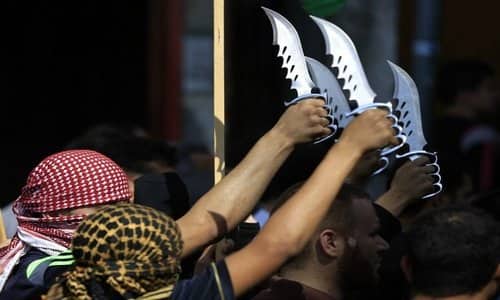Palestinian Incitement Skyrockets As Monthly Salary Given To Latest Terrorist
 By Ben Cohen/Algemeiner.com July 27, 2017
By Ben Cohen/Algemeiner.com July 27, 2017
"This is definitely going to put wind in the sails of the Taylor Force Act," said Jonathan Schanzer, an expert on Palestinian politics at the Washington, DC-based Foundation for the Defense of Democracies (FDD) think tank.
Named in memory of former US Army officer Taylor Force, who was murdered in a Palestinian terrorist attack in Tel Aviv in March 2016, the act, if passed, will place severe restrictions on American aid money to the PA until it ends both incitement to terrorism and the "martyr payments" policy.
The fund's monthly payments -- totaling at least $300 million annually -- far exceed the average monthly wage earned by Palestinian professionals, including PA civil servants.
Schanzer said that "supporters of the Taylor Force Act have been looking for additional momentum, in terms of cutting funds to the PA over terrorism."
Schanzer observed that while the payments to al-Abed are unlikely to win additional friends in Washington, DC for PA President Mahmoud Abbas, providing financial support for terrorists is "wildly popular in the West Bank."
On the wider question of whether the PA will ever abandon the martyr payments policy, Schanzer said that some compromise was still theoretically possible. For example, the PA could transfer the responsibility for the payments to the PLO, which could certainly afford the sum, he said.
"That is potentially a better move," Schanzer continued. "The US taxpayer would no longer be funding salaries and stipends to terrorists, and it will shift focus back to PLO as an actor that supports terrorism."
Another potential advantage for the PA, Schanzer said, is Israel's reluctance to see it collapse -- an outcome that could force the Jewish state to resume direct administration of the West Bank.
However, Israel may not be so indulgent if Abbas maintains the freeze on security cooperation between the PA and the Israeli authorities that he announced on Friday, Schanzer said.
"If the ban holds, the Israelis may need to reconsider the arrangement," he said. "All these decisions are for Abbas to make, because he leads both the PA and the PLO."
There was little sign of a conciliatory mood on Tuesday, as Abbas's Fatah faction took to social media to demand the "thwarting" of the "Zionist plans" on Jerusalem's Temple Mount -- a reference to the placing of security cameras there, following Israel's decision to remove the metal detectors installed at the entrances to the holy site earlier this month.
Both Fatah and the PA have very publicly incited Palestinian violence in Jerusalem over the last week, despite Abbas' pledge to US President Donald Trump in May that "Palestinian children are being raised in a culture of peace."
Itamar Marcus -- the executive director of Israeli research organization Palestinian Media Watch (PMW) -- told The Algemeiner he had noticed a sharp increase in the volume of posts, speeches and videos preaching incitement since the latest Palestinian campaign began.
The volume is "definitely much, much higher." Marcus said. "We find it difficult to even decide which posts to translate, there are so many."
On Tuesday, Abbas renewed a call to the Islamist Hamas organization -- which rules Gaza and is committed to the physical elimination of Israel -- "to work toward unifying the Palestinian people and turn the struggle toward Jerusalem and Al-Aqsa Mosque," the Palestinian news agency Ma'an reported.
Hamas responded that Abbas' severing of relations with Israel was "meaningless without the lifting of the restrictions on Gaza, stopping security coordination (with Israel), and an end to reining in the resistance to the occupation."






